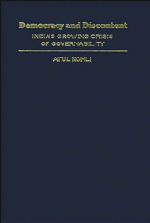Book contents
- Frontmatter
- Contents
- List of tables and figures
- Preface and acknowledgments
- PART I INTRODUCTION
- PART II THE GROWING PROBLEMS OF GOVERNING THE PERIPHERY: POLITICS IN THE DISTRICTS
- PART III ORDER AND BREAKDOWN IN THE STATES
- PART IV CENTRALIZATION AND POWERLESSNESS AT THE CENTER
- Introduction: the Center
- 11 Managing the economy: halfhearted liberalization
- 12 Managing the troubled political institutions: the Congress party and relations with Punjab
- Conclusion: the Center
- PART V FINAL INFERENCES
- Bibliography
- Index
12 - Managing the troubled political institutions: the Congress party and relations with Punjab
Published online by Cambridge University Press: 05 June 2012
- Frontmatter
- Contents
- List of tables and figures
- Preface and acknowledgments
- PART I INTRODUCTION
- PART II THE GROWING PROBLEMS OF GOVERNING THE PERIPHERY: POLITICS IN THE DISTRICTS
- PART III ORDER AND BREAKDOWN IN THE STATES
- PART IV CENTRALIZATION AND POWERLESSNESS AT THE CENTER
- Introduction: the Center
- 11 Managing the economy: halfhearted liberalization
- 12 Managing the troubled political institutions: the Congress party and relations with Punjab
- Conclusion: the Center
- PART V FINAL INFERENCES
- Bibliography
- Index
Summary
After coming to power in late 1984, Rajiv Gandhi identified the new government's policy priorities: to reform the economy, to rehabilitate the Congress party, and to repair New Delhi's relations with such troubled states as Punjab and Assam. In each of those crucial problem areas Rajiv's government committed itself to a new approach. The extent of its success in economic-policy reform was discussed in the preceding chapter. In this chapter, the focus shifts to an evaluation of Rajiv's attempts to reinvigorate the Congress party and to find a solution to the vexing problem of Punjab. The primary purpose of this discussion is not to assess Rajiv's leadership qualities. Although the quality of leadership is an important variable in any government's ability to rule, a focus on the political process of problemsolving allows one to identify broader issues: the changing nature of the Indian state at its summit, and the changing ability of the state to solve political problems by action from above.
It is argued here that after a promising start, Rajiv's efforts to strengthen the Congress party and to impose political order in Punjab began to falter under familiar political pressures. That Rajiv's policies in those areas were not very successful is known to even casual observers of contemporary India. The main task in this chapter, therefore, is not to document those failures but, rather, to explain them. What we seek to understand is why electoral popularity in contemporary India, even massive electoral popularity, does not confer on the victor greater power to solve society's problems.
- Type
- Chapter
- Information
- Democracy and DiscontentIndia's Growing Crisis of Governability, pp. 339 - 377Publisher: Cambridge University PressPrint publication year: 1991



